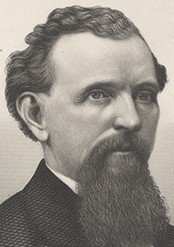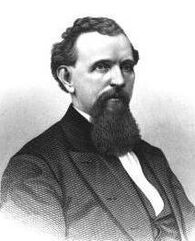Roderick R. Butler
| Roderick Randum “R. R.” Butler | |||
|---|---|---|---|
| |||
| Former State Senator from Tennessee From: 1893–1901 | |||
| Predecessor | ??? | ||
| Successor | ??? | ||
| Former U.S. Representative from Tennessee's 1st Congressional District From: March 4, 1887 – March 3, 1889 | |||
| Predecessor | August H. Pettibone | ||
| Successor | Alfred A. Taylor | ||
| Former State Representative from Tennessee From: 1879–1885 | |||
| Predecessor | ??? | ||
| Successor | ??? | ||
| Former U.S. Representative from Tennessee's 1st Congressional District From: March 4, 1867 – March 3, 1875 | |||
| Predecessor | Nathaniel G. Taylor | ||
| Successor | William McFarland | ||
| Former State Representative from Tennessee From: 1859–1862 | |||
| Predecessor | ??? | ||
| Successor | ??? | ||
| Information | |||
| Party | Whig (before 1860s) Republican (since 1860s) | ||
| Spouse(s) | Emeline Jane Donnelly (died 1899) | ||
| Military Service | |||
| Allegiance | United States | ||
| Service/branch | Union Army | ||
| Service Years | 1862–1864 | ||
| Rank | Lieutenant Colonel | ||
| Unit | 13th Regiment, Tennessee Volunteer Cavalry | ||
Roderick Randum Butler (April 9, 1827 – August 18, 1902), also known as R. R. Butler,[1] was a Tennessee Unionist and Republican who served in the state legislature as well as the United States House of Representatives. Staunchly opposing secession, he led crucial efforts in Eastern Tennessee to assist the Union during the Civil War.
His middle name Randum[2] is sometimes misspelled as "Random."[3]
Butler's grandson, Robert R. Butler, was a U.S. representative from Oregon who served in the House from 1928 to 1933.
Contents
Background
Butler was born in Wytheville, Virginia, located in the mountainous Appalachia counties in the state's western portion. He was the youngest son born to George Butler, and a grandson of Maryland Lutheran reverend J. G. Butler.[4] After leaning the tailor's trade as an apprentice, he attended night school, and was admitted to the bar in 1953 after studying law.
As a lawyer, Butler practiced law in Taylorsville. During the presidency of Millard Fillmore, he was appointed postmaster general.
He married the former Emeline Jane Donnelly in 1849, and the couple's children included Richard H. Butler (1847–1929), James G. Butler (1849–1921), Mrs. Virginia L. Butler Church (1850–1926), John Bell Butler (1854–1917), William Roderick Butler (1857–1928), Samuel Butler (1858–1942), Edward Butler (1864–1930), and Mrs. Rebecca Butler Keys (1866–1954).[3]
State legislature, secession, Civil War
Butler was elected to the Tennessee legislature in 1959, running as a Unionist in a Democrat-dominated state.[5]
As a member of the Tennessee House of Representatives, Butler was among the state legislators who voted against seceding from the Union.[4][6] After the measure passed, he was among several state representatives, along with future House colleague Horace Maynard, to oppose resistance methods deemed revolutionary or extreme.[7]
State law required legislators to take an oath swearing allegiance to the Confederacy, and refusal would often result in being sent to prison in Alabama.[5] Butler took the oath on the grounds that he could then work to aid the Union cause effectively, though was nonetheless criticized for the decision.
In 1861, several bridges in Eastern Tennessee were burned down in an effort to derail Confederate military strategies, and Unionists in the region were subsequently arrested and brought to Nashville on treason charges.[5] Butler, who himself was also arrested twice by Confederates, represented the Unionists brought to court due to his lawyer background and made efforts to return them to their homes.
Butler played a role in organizing the 13th Tennessee Union Cavalry, which he joined in 1862 as a Lieutenant Colonel.[5] He ultimately resigned his position a year prior to the war's conclusion due to health reasons.
In 1865, Butler served as a delegate to Tennessee's state constitutional convention.
Post-war years
Following the Civil War, Butler returned to practicing law and sought to ensure pensions for black soldiers in the Union.[5]
U.S. House of Representatives
In 1867, Butler ran for U.S. House and easily defeated opponent James White in the general election by a landslide, polling 87% of the vote.[8] He was re-elected three times, though was defeated in the 1874 midterms.[9] After rebounding in 1886, he did not run the following year. His final run for the seat was in 1890 as an Independent Republican against official party nominee Alfred A. Taylor, where he narrowly lost.[10] The Jim Crow Democrat-dominated state legislature at one point gerrymandered the congressional district to weaken the GOP stronghold in hopes of ousting him.[4]
During the 1867–69 congressional session (40th Congress), Butler's membership in the House was contested on the grounds that he was a member of the Tennessee legislature when the state was part of the Confederacy.[4] However, Elections Committee chair Henry L. Dawes stated:
| “ | There is presented evidence in the person of Mr. Butler a remarkable instance of a man of position in a community in which he resided, of influence among his fellow-men, of such mind and character and attainments among his fellow-citizens as to exert a widespread influence for good or for evil, who, at the outbreak of the rebellion never trembled in the balance between Union and disloyalty, but stepped out from associations and from influences calculated to draw him into a vortex of the rebellion and broke away from such influence, and facing the danger and peril of the hour, actuated by patriotism as pure, as disinterested, as self-sacrificing, and efficient as ever actuated any gentleman occupying a position where he could make his mark or his influence felt in the great struggle through which we have passed. | ” |
| —Rep. Dawes, Chairman of House Committee on Elections | ||
Butler was censured by the House in mid-March 1870 by a 158–62 vote[4] for selling an appointment to the United States Military Academy.[11] An expulsion motion also received a vote, and while it elicited a 102–68 majority with the yeas supplied by Democrats and half of Republicans,[12] it did not reach the required two-thirds threshold.[4] The New York Times had reported on July 30 that year:[13]
| “ | There are serious charges pending before the Pension Office against Congressman RODERICK R. BUTLER, of Tennessee. A strong array of evidence has been brought to convict Mr. BUTLER of fraud, if not of forgery, in pension cases with which he has occupied himself. An officer is engaged in getting up the remaining facts on the case, and Mr. BUTLER is expected here on Wednesday to give some explanation of the affair, which seems likely to be made the subject of judicial investigation. | ” |
| —The New York Times, July 30, 1870 | ||
This occurred prior to the passage of the Pendleton Civil Service Reform Act sponsored by Ohio Copperhead George H. Pendleton, which replaced the traditional spoils system with civil service reform. Until the Pendleton Act passed, Republicans utilized the mechanisms of the spoils system via patronage to benefit their causes and safeguard the rights of newly freed blacks.[14]
Following Butler's censure, his constituents in Johnson County, Tennessee responded sharply in support of the congressman, and without regard for party affiliation gathered at the county to pass resolutions praising him.[4] A large assembled convention resulted in a unanimous vote affirming adamant local support for Butler.
Returns to state legislature
According to a short biography in Notable Men of Tennessee:[1]
| “ | It is not surprising that Judge Butler is thus constantly returned to the Legislature, for he is an able and faithful member. Though a bold and outspoken Republican, [Butler] is popular with both parties, and can always secure the passage of all measures affecting his constituents. Perhaps no member of that body is so blunt and candid in criticism of the Democratic Party, yet all like him personally. | ” |
| —Notable Men of Tennessee: From 1833 to 1875; Their Times and Their Contemporaries, p. 77–78 | ||
Death and internment
Butler died in mid-August 1902 and is interred at Mountain View Cemetery, located in Mountain City.[3]
See also
- Leonidas Houk, Republican U.S. representative from Tennessee's 2nd district
- Brazilla Carroll Reece, later Republican U.S. representative from Tennessee's 1st district
References
- ↑ 1.0 1.1 Temple, Oliver Perry. Notable Men of Tennessee: From 1833 to 1875; Their Times and Their Contemporaries, pp. 77–78. Google Books. Retrieved November 6, 2021.
- ↑ Butler, O to R. The Political Graveyard. Retrieved November 6, 2021.
- ↑ 3.0 3.1 3.2 Roderick Random Butler. Find a Grave. Retrieved November 6, 2021.
- ↑ 4.0 4.1 4.2 4.3 4.4 4.5 4.6 Barnes, William Horatio. The American Government ...: Biographies of members of the House of representatives of the Forty-third Congress, pp. 77–80. Google Books. Retrieved November 6, 2021.
- ↑ 5.0 5.1 5.2 5.3 5.4 Paykamian, Brandon (November 2, 2019). Rep. Roderick Butler, a leader to local Civil War Unionists. Johnson City Press. Retrieved November 6, 2021.
- ↑ Temple, Oliver Perry. East Tennessee and the Civil War, p. 223. Google Books. Retrieved November 6, 2021.
- ↑ East Tennessee and the Civil War, p. 352.
- ↑ TN - District 01 Race - Aug 01, 1867. Our Campaigns. Retrieved November 6, 2021.
- ↑ Candidate - Roderick R. Butler. Our Campaigns. Retrieved November 6, 2021.
- ↑ TN - District 01 Race - Nov 04, 1890. Our Campaigns. Retrieved November 6, 2021.
- ↑ McFadden, Robert D. (November 29, 2010). House Censure: Humbling to Some, but Not All. The New York Times. Archived version available here. Retrieved November 7, 2021.
- ↑ TO PASS A HOUSE RESOLUTION PROVIDING THAT RODERICK R. BUTLER BE EXPELLED AS A MEMBER OF THIS HOUSE. (P. 2031-3).. GovTrack.us. Retrieved November 7, 2021.
- ↑ July 30, 1870. WASHINGTON.; Serious Charges Against a Congressman--The City Government Troubles--More Troops for North Carolina--The Alaska Seal Fisheries--Revenue Matters--Personal.. The New York Times. Retrieved November 7, 2021.
- ↑ Matthews, Dylan (July 20, 2016). Donald Trump and Chris Christie are reportedly planning to purge the civil service. Vox. Retrieved November 12, 2021.
External links
- Profile at the Biographical Directory of the United States Congress

